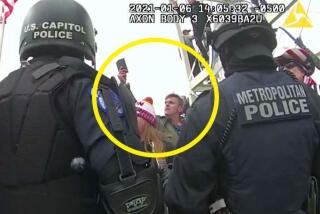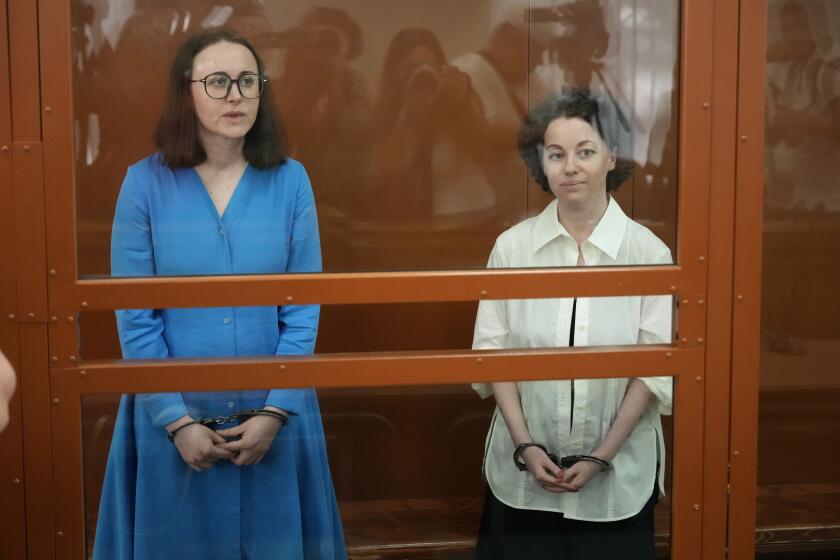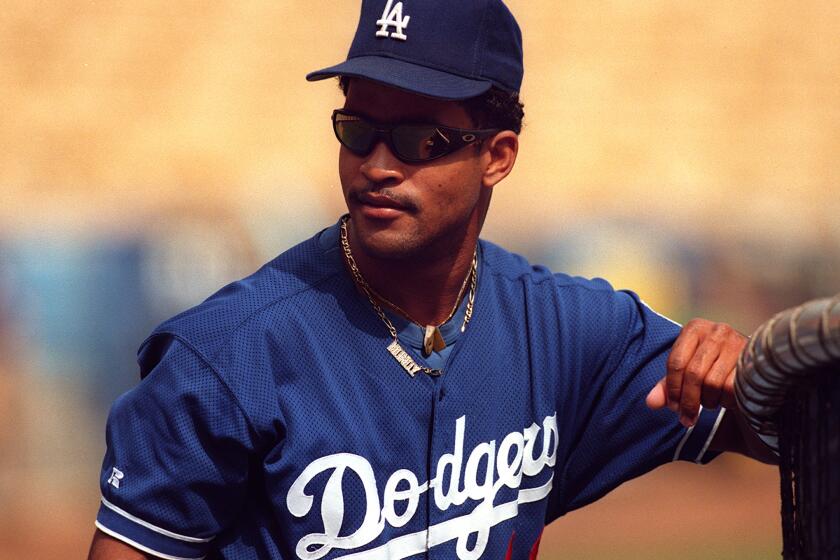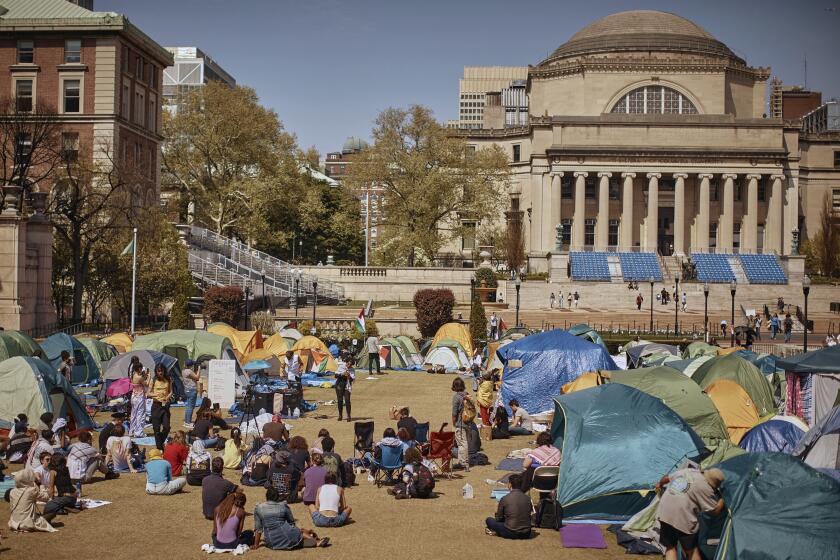Richard Goldstone : Judge’s Much Admired Commission Rectifies Injustice In South Africa
Judge Richard Goldstone was buying a magazine in the gift shop of his hotel here recently when another customer shoved a piece of paper in front of him. To the judge’s surprise, the man smiled and asked for his autograph.
That may well be the only time in the history of this troubled country that anyone has asked a white judge for his autograph. But these are not ordinary times in South Africa, and Goldstone is no ordinary judge.
The 54-year-old jurist is chairman of the Commission of Inquiry Regarding the Prevention of Public Violence and Intimidation--or, as it is commonly known, the “Goldstone Commission.” In just 18 months, Goldstone has become one of the most respected men among both blacks and whites.
He has been called the chief referee in South Africa, and his commission’s public inquiries have played an unrivaled role in keeping the fragile negotiations process on track. In a country where the government and the judicial system are distrusted by millions of blacks, Goldstone’s commission has managed to maintain its reputation as an impartial adjudicator. His willingness to investigate everything from government covert operations to township massacres to left-wing black terrorism, quickly and without fear or favor, has gone a long way toward keeping a lid on tensions.
“We haven’t agreed with all his findings,” said Carl Niehaus, a spokesman for the African National Congress, which has occasionally been the target of commission criticism. “But we do find him a person of integrity.”
President Frederik W. de Klerk had consulted with ANC President Nelson Mandela and other political leaders before appointing Goldstone to head the commission. Since then, the commission has grown rapidly, embarking on 22 inquiries and adding a 40-member investigative staff. Today, several inquiries are sitting simultaneously under Goldstone-appointed chairmen. And in the past two weeks, Goldstone announced two new inquiries. One will investigate all violence affecting the coming election campaign and a second will investigate the police force under the command of Inkatha Freedom Party leader Mangosuthu Gatsha Buthelezi in the KwaZulu homeland.
Goldstone was born in a suburb of Johannesburg. He worked as an advocate for 17 years before being appointed to the bench, in 1980. In 1989, he rose to the Appellate Division Supreme Court in Bloemfontein, the nation’s highest court.
He headed a one-man inquiry into the shooting of nine black protesters by police in 1990, and won praise for his courageous finding that, while the protest was poorly organized, the police had acted improperly. Nine police officers were eventually charged.
Goldstone and his wife, Noleen, spend most of their time on the road, moving between their apartment in Cape Town and hotels in Johannesburg and Bloemfontein. They have two grown children and, now, one grandchild. Goldstone is a thoughtful man who seems to relish the dual challenge of his judicial and commission duties. To relax, he listens to music, mostly classical, and likes good wine--”South African, yes, but preferably French,” he says.
*
Question: Your commission has the power to subpoena witnesses and order them to answer incriminating questions. It also has the power to enter any premises in South Africa and search for and seize documents. And, yet, it is not a court. Why is that distinction important?
Answer: We’ve got none of the powers of a court. The fact that I’m a judge gives the commission no more power than if a non-judicial officer were presiding. If witnesses don’t turn up to answer our subpoena, we refer the case to the attorney general for prosecution.
Generally, I wouldn’t like to have powers of contempt, powers of arrest and all of those things because it would turn us truly into a judicial proceeding, which we’re not. And I believe that would inhibit my ability to consult. You can’t consult with people when you’re sitting in a judicial capacity--one has to remain absolutely out of it.
Q: Whom do you consult with?
A: From the word go, I’ve consulted widely with the main parties interested in what we’re doing. For two reasons. Scott Kraft has been The Times bureau chief in South Africa since 1988. He interviewed Richard Goldstone in his hotel suite in downtown Johannesburg.
Firstly, to get advice from people with an interest in our work, and that’s been invaluable. And, secondly, to inform. It’s important for people who are involved to understand why we’re having inquiries in some matters and not in other matters. What’s made it easy is that nobody has mistaken consultation for seeking agreement. I haven’t consulted to get agreement. If people do agree, that’s good. If they don’t, it doesn’t mean we’re not going to take action.
Q: The commission is the only truly independent investigative body operating in the country today. Why is it important for the country’s future?
A: It’s important for a number of reasons. First, as a safety valve. When traumatic incidents occur it’s important for a credible authority to be able to hold a public hearing, quickly. People want to know the facts.
It’s also important because violence is the single largest block to successful negotiation and a peaceful settlement. So our work is obviously of vital importance to all South Africans.
Also, the commission is a wholly indigenous body which has credibility over a wide spectrum. It welcomes cooperation with the international community but it remains a local organization and that makes South Africa different from all other really troubled countries,
Q: Quick hearings do act as a safety valve. But some parties have been frustrated that the commission rarely makes a clear assignment of blame.
A: As I judge, I don’t find that frustrating at all. It happens in the great majority of cases, because in real life there aren’t people who are all good and others who are all bad. Especially in a complex situation, people frequently tend not to act with the best judgment and it’s difficult to be an armchair critic. One thing I’ve learned on the bench is not to judge people’s actions under extreme provocation or emotion as one would if they had time to reflect. But, having said that, one’s got to judge people and we’d be less than honest if we ignored any relevant facts. I reject any notion that we’ve ever, in any report, done a balancing act.
Q: You were appointed to head this commission by President de Klerk. Do you have the final say in determining what matters to investigate?
A: Absolutely. The most important criterion in choosing incidents of violence to inquire into is whether we will learn from them causes of violence generally either in a region or, preferably, in the country as a whole. It’s not our job and we don’t have the resources to investigate every one of the thousands of incidents of violence. So we’ve had to choose and we’ve tried to choose carefully.
Q: Have you broadened your scope?
A: Well, it’s changing. There were no rules laid down for us as to how we exercised our powers. And the first obvious area was to look into what seemed to be paradigm cases of violence.
The second was to use our powers of subpoena to stop political statements which were violence-provoking. We didn’t do that frequently but we did it, I think--successfully on at least two occasions--where irresponsible statements were made by political leaders and we immediately called them in and interrogated them in public. And the fact that people know the commission does do that acts as some sort a brake.
We also have used our power of search and seizure in three cases. One was the abortive raid on a farm outside Heidelberg, when we did nothing but wake up an elderly farmer, his wife and child. But that was an important exercise and we showed the public that not only did we have these powers but that we would use them. We used them again, with more dramatic results, when we raided a mine compound not far from Johannesburg and found the Koevoet group (a notorious police counterinsurgency unit) and that led to its disbandment by the state president. And perhaps more dramatically, the raid on military intelligence in November.
This year, it seems our inquiries have moved from inquiries into specific incidents more to broader inquiries. We’re just sitting in Natal inquiring into causes of violence other than Inkatha-ANC rivalry. We’ve got to look into that. The inquiry into the illegal importation of firearms and explosive devices is a broader inquiry. So is the whole inquiry into the covert operations of the security forces. And there are others in the pipeline.
Q: As someone who has studied the violence closely, have you been surprised by anything you’ve learned?
A: I’m not easily surprised. But if one thing has surprised me it’s the large number of people who are capable of committing horrible acts of violence in this society. I suppose I was innocently of the view that it was only a very few people, on the fringes of society, who could take an automatic weapon and mow down innocent men, women and children. And the number of incidents--train violence, violence generally involving killing and injuring and maiming innocent people--happens with such horrible frequency that I think that surprised me more than anything else. I was really surprised at human conduct more than anything else.
Q: Do you feel that threat when you travel to black townships?
A: This is the strange thing. I’ve never felt in any way threatened. I see friendly faces, smiling faces and I’m not talking about people who know who I am. Whether walking in the streets of the city or going to black townships, I see smiles, not scowls. That’s why I wonder: who are these people who commit these acts of violence. They’re not the people I look at when I walk in the streets or drive around towns, cities and villages in South Africa.
Q: Do you think South Africa can reach a settlement despite the violence?
A: I believe we have to. If it is held up because of violence, you’re giving a veto to the people who are committing violence. You can’t do that.
Q: The South African police have a poor reputation among blacks here. Does that concern you?
A: Clearly, I think every South African should be concerned. Without a credible, efficient police force, it’s going to be more difficult if not impossible to really curb the violence. Obviously, black South Africans have seen the police force correctly and justifiably as being the implementers of racial laws. That legacy is going to take a great deal of effort and some time to reverse. Senior policemen are very consciously trying to reverse those very perceptions. But, until we have a democratic Parliament passing legitimate laws, I don’t think they’re really going to succeed fully.
Q: What role do you see for the commission in the election campaign?
A: We’re going to have an important role to play in giving judgment after the election. I think it’s very important for a local, credible organization to be involved in what has been left solely to the international observers in other countries. I’m not suggesting for a moment that we’re not going to work closely with the international observers. I’d like to believe that we will arrive at the same result, either calling foul or not. It is very important for this election to be legitimate, even if there’s violence.
Q: Some right-wing critics have suggested you have larger ambitions, perhaps to be part of a future ANC-controlled government?
A: I’ve really got no ambitions other than to remain on the bench. It’s what I enjoy and that’s my career.
Q: But you already have a political role, don’t you?
A: Politics and dealing with politicians, but not taking political decisions. There’s a big difference. I’ve got no constituency other than the public. I’m not a politician in that sense.
Q: There seems to be a need in this country for someone like that, someone who is above politics.
A: I’ve got no function other than to expose the causes of violence. And whatever the political consequences of what we find, so be it. If one is in politics, it’s very different, you’ve got a political agenda, a good one or bad one, it doesn’t matter. On the commission we’ve got no agenda other than to expose the causes of violence and to make suggestions to stop it. We don’t have to weigh the consequences of exposing the truth.
More to Read
Start your day right
Sign up for Essential California for news, features and recommendations from the L.A. Times and beyond in your inbox six days a week.
You may occasionally receive promotional content from the Los Angeles Times.







